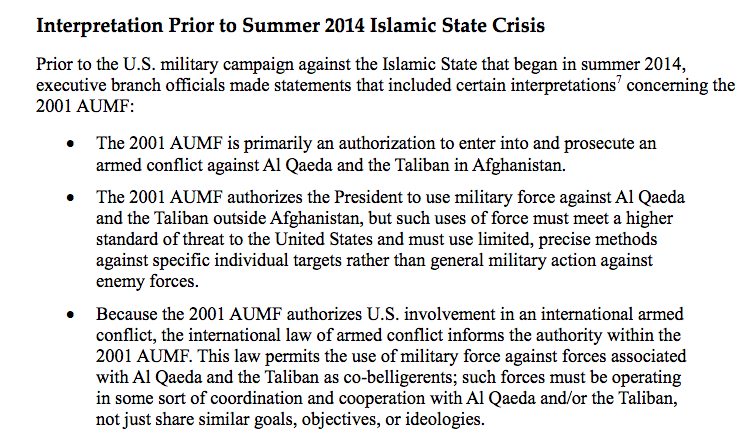Unbeknownst to many Americans, the United States has significantly expanded its military presence in Africa amid the ongoing “War on Terror,” a mostly overlooked footprint that includes Camp Lemonnier, a naval base two miles off the coast of the Gulf of Aden.
While Lemonnier is the only formal military base on the continent, the military counts nearly four dozen “outposts” across Africa as part of its ever-growing expansion, according to secret U.S. military documents obtained by TomDispatch.com a project of The Nation Institute.
Contrast the amount of coverage devoted to America’s ongoing war with the so-called Islamic State, also known as ISIS, and with that of drone attacks and elite U.S. Special Forces raids in Africa, including a botched raid in a small village in Yemen shortly after President Donald Trump took office. That risky operation led to the death of a U.S. commando and killed more than a dozen civilians, including nine children. More recently, a horrific terror attack in Somalia that claimed the lives of more than 300 was reportedly retribution for a U.S.-led operation that killed several children in August.
In a way, the surprise attack in Niger, the deadly raid in Yemen, and the botched attack in Somalia are inexorably linked by a ballooning global war on terror that has its origins in a paragraph-long force authorization Congress approved shortly after the Sept. 11, 2001 attacks.
The 2001 Authorization for Use of Military Force, which is only 60 words in entirety, empowered then-President George W. Bush to wage war against the perpetrators of 9/11, meaning al Qaeda. Since then, the law has been used to justify multiple wars across the Middle East and Africa, ever-expanding drone missions, the slaying of a U.S. citizen, and the indefinite detention of enemy combatants, including 41 prisoners who remain at Guantanamo Bay, Cuba, without charge.
Considering the breadth and scope of U.S. military operations since the authorization was enacted and the nearly $5 trillion spent on the ongoing war, not to mention the 7,000 U.S. casualties and counting, the 2001 AUMF is quite literally the most significant, yet misunderstood law in modern U.S. history.
Even so, there’s many Americans who remain unfamiliar with the original spirit of the force authorization and the way in which three consecutive administrations have completely adapted it to rationalize large-scale warfare.
A 2015 report produced by the nonpartisan Congressional Research Service outlined how the 2001 AUMF’s legal interpretation has evolved since it was first established.

Screengrab from the Congressional Research Service’s 2015 on the 2001 AUMF’s continued application.
“It really is amazing. This thing has been with us for more than 15 years. It has had such an impact on American culture and the things that we see all around us everyday and we get used to, and I think a lot of people don’t even know it exists,” Elizabeth Beavers, foreign policy manager at Indivisible, tells News Beat podcast.
The United States has no rival when it comes to waging war. As it stands, its military is currently fighting at least seven wars in the Middle East and Africa, chief among them a pair of tremendously unpopular and seemingly endless conflicts in Iraq and Afghanistan.
What’s unique about America’s current clashes, which have been characterized by high civilian death tolls, the unusual frequency of military deployments, and the proliferation of brutally effective killing machines, is the complete absence of a formal declaration of war by the U.S. Congress, the only branch of government empowered by the Constitution to approve war.
The war against ISIS, for instance, was never sanctioned by Congress. Ditto for U.S. Special Forces raids in Yemen, wars against al Qaeda in the Arabian Peninsula and related terror cells dotting the Middle East and North Africa, and the escalating drone wars. That April 2017 bombing raid against the Syrian government ordered by President Donald Trump in retaliation for an alleged chemical strike orchestrated by the Syrian regime was also not authorized by the very elected officials that ostensibly decide whether America should go to war.
Consequently, the executive branch effectively wields all war-making power—an unprecedented coup that provokes little outrage from a war-exhausted nation. Even members of Congress who’ve spent the last eight years railing against the Obama administration for alleged executive overreach on immigration and healthcare, among other perceived constitutional abuses, have been remarkably silent on what is perhaps their most awesome responsibility.
“Right after the attacks of 9/11, back in 2001, there was this sort of rush to respond and then President Bush was really interested in launching this so-called global war on terror,” says Beavers. “As we all learned in 9th grade civics class is the responsibility constitutionally for Congress to declare war, Congress to authorize military force, it’s not for the president.”
The truth is that the U.S. Congress has completely abdicated its war-making authority, for decades.
Congress has only declared war 11 times, beginning with the War of 1812. The last time such a declaration was approved by its body was in a series of measures passed on June 4, 1942, seven months after the Pearl Harbor attacks on its U.S. naval base in Hawaii. It was on that date that Congress, in a succession of declarations, unanimously approved war with the governments of Bulgaria, Hungary, and Romania. (Congress had already permitted war against a coalition of countries that headed the Axis Powers, mainly Germany, Italy and Japan.)
In a matter of seven months between 1941 and 1942, the United States had vowed to take military action against a half-dozen countries. In the ensuing 75 years there has been no official declaration of war for any of America’s many military entanglements. The United States didn’t declare war in either Korea nor Vietnam; instead, the former was justified under a United Nations resolution previously adopted by the U.S. Senate, and the latter, the Gulf of Tonkin Resolution, which Congress passed on Aug. 7, 1964.
“The founders prepared for a power-hungry executive,” says Beavers. “They knew in their minds that particularly in a time of war and a time of conflict, or as a justification under security, that an executive might want to grab new powers. And that’s why they gave Congress the ability to say no. And until this AUMF is repealed, it remains as all-too-easy a tool for an executive to rely on it do more and more dangerous things.”
A small bipartisan coalition in Congress has advocated for the repeal of the 2001 AUMF and to start again anew, but these passionate calls to undo a seemingly outdated authorization have so far been drowned out by daily controversies in Washington and a lack of desire to vote on war, which has become a veritable third rail in American politics since the disastrous Iraq War Resolution of 2002.
Given Congress’ apparent satisfaction with remaining on the sidelines while more Americans die abroad, a third-generation U.S. soldier has taken it upon himself to check the powers of the executive, and quite possibly, change how American wars abroad are fought.
SACRED OATH
U.S. Army Captain Nathan Smith took his oath to defend the Constitution so seriously that when he was set to be deployed to Kuwait in 2015, he didn’t even ask his command to reconsider despite his mother falling ill just a few months prior.
While in Kuwait, he’d go back to the barracks after he completed his shift and made it a priority to call home every day. The emotional weight made an already difficult mission that much harder. Yet he eventually found his footing, and dedicated a large portion of his time reading about the war against ISIS, specifically, its legal justification.
Smith was serving in the command center for Operation Inherent Resolve, the operational name for the war against ISIS. He came across an article in The Atlantic written by Richard Ackerman, in which the Yale University constitutional law professor argued that the 2001 AUMF would be vulnerable to a legal challenge by a member of the military. The case that Ackerman was making in the magazine was that a soldier, unlike a private citizen, would have standing to bring a lawsuit against the White House on the grounds that an illegal war violates their oath to support and defend the constitution.
At that time, Smith was supportive of the mission to destroy ISIS, as he considered the terror group to be a “reprehensible enemy.”
Still, Smith kept returning to the oath that he took, and the questionable legal ground upon which the ISIS war was being carried out.
“A lot of times in the military people will use a saying, that when you take your commissioning oath or your enlistment oath, you’re writing a check to the U.S. government up to and including your own life,” Smith told News Beat podcast.
“That kind of illustrates how seriously people in the military take that oath,” he continued. “And that’s how I viewed it. And the problem is that when you take that oath, I think it’s kind of a two-way agreement in a certain sense in that I am writing a check up to and including my own life, but I am writing that check because I believe in the system of government and the constitution of the United States, and I believe that it sets a moral, ethical framework for me to use whatever abilities I have to risk my life or apply lethal force on others if that’s so needed. I felt like that when this action was taken, and we start going outside the framework of the constitution, we’re going outside the framework of the oath that I took because I didn’t take an oath to serve in a system where the president unilaterally declares war and deploys troops.”
Smith wrestled with the decision, but decided challenging the constitutionality of the ISIS war was the right thing to do. With his mind at ease, Smith’s attorneys emailed him the legal briefs, which he had to sign and fax.
It was a “surreal” moment, Smith recalled.
“I remember hesitating for a minute, because I knew that as soon as I pushed that button, there was no bringing it back,” he said.
The suit was filed in May 2016. Smith was officially suing President Obama—his commander in chief.
Smith’s initial suit was dismissed in federal court in Washington, D.C. He’s now appealing.
He hasn’t voiced any regrets.
“I’m not a pacifist by any means,” Smith said, noting that the oath a soldier takes is almost identical to the oath of a member of Congress states prior to taking office. “But if it’s so important for the country’s national defense that we need to go from a state of peace to a state of war than it seems to me that the least that can happen is the Congress of the United States can do their jobs and vote on that as the constitution dictates.”
TRUMP’S WAR
While Smith continues to challenge the justification for war, the Trump administration is on track to surpass the number of strikes carried out by his predecessor. In war-torn Yemen, for example, the Trump administration, as of September, tallied more than 100 strikes against an al Qaeda affiliate, up from three dozen in 2016, according to Newsweek. Similarly, an investigation by the nonprofit Air Wars, which tracks civilian casualties, revealed that more than 2,000 civilians had been killed in Iraq and Syria in coalition raids in Trump’s first seven months in office. The administration is on pace to more than double the previous administration’s civilian casualty count, Air Wars reported.
That the military under Trump is escalating the war on terror to never-before-seen heights appears consistent with promises the real estate mogul made on the presidential campaign trail. At one point, the reality TV star-turned-politician bragged that he’d bomb “the shit out of ISIS” if elected. This is one campaign promise Trump is living up to.
Although many Republicans accused Obama of being weak on terror, the truth is he oversaw a dramatic overhaul of the drone program to bomb at least seven countries, assassinate an American citizen, and kill hundreds of alleged enemy combatants and civilians. Mostly as a whole, Democrats refrained from criticizing Obama’s seemingly out-of-control drone campaign because the former constitutional law professor projected an even-keeled demeanor that earned him a level of trust Trump’s flamboyant and bullish approach to war has not.
“When it comes to imperial policies, when it comes to the military industrial complex, when it comes to drone strikes, when it comes to dropping bombs, especially on Muslim countries, the difference between a Hillary Clinton and a Donald Trump and a Barack Obama is very, very small on that international front,” Dr. Cornel West, professor of the Practice of Public Philosophy at Harvard University, told News Beat podcast. “Domestically, there is a difference, no doubt about that. About rights and liberties and so forth. There is a difference. But when it comes on the international front, that’s part of the problem of trying to keep track of the American empire and its policies even as you keep track of the American domestic activities that are going on.”
“Bush has 45 strikes—drone strikes—and Obama has over 500. Bush is a war criminal but Obama is not. You see, that’s ridiculous. You’ve got to be morally consistent,” West, one of the leading intellectuals of our time, added. “When we talk about neoliberalism, you’re talking about a privatizing and militarizing that collapses public spaces, public conversation, public accountability, public answerability for elites at the top.”
Now Trump has access to an ever-expanding arsenal of weapons he can use at a moment’s notice. The United States’ impressive slate of weaponry, combined with an ever-changing interpretation of the 2001 AUMF, gives Trump all the ammo he needs to wage war whenever, and wherever, he sees fit. Just like Bush, and just like Obama.
It’s a cycle of devastation that Congressional representatives appear disinterested in breaking.
“There’s still a global war mindset and practices that need to be addressed,” said Beavers. “But the whole idea that there’s this domestic legal justification that has been so frequently invoked with so little accountability, it just sets that dangerous precedent that we really need to scale back or else this is going to just go on forever, and more and more things are going to be kind of shoehorned into that scope of authority.”
If anything, America’s war footing is likely to grow, as a much-maligned Congress continues to fail to live up to its sacred oath.










